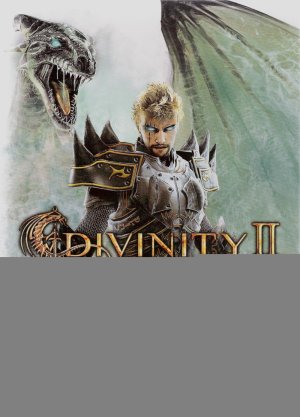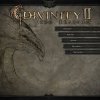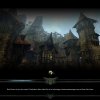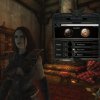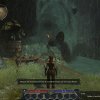A moment of weakness doomed the Divine called Lucian. Instead of putting an end to all the misery by killing the child of the God of Lies, he showed mercy, let it live and even put it on himself to raise him. A most fatal decision, as it made it possible for the Black Ring to introduce Ygerna, daughter of Kalin, a necromancer in the ranks of the Black Ring, into the life of Damian as the boy was called. Bound to her through his love, Ygerna released the powerful magic slumbering inside of Damian. When Lucian learned of what Ygerna had done, he had no choice than to execute her. Being witness to the execution, Damian bound his soul to Ygerna and by doing so marked the return of the Damned. Damian swore revenge for the death of Ygerna but his rage and anger were also his doom. In the battle between the Black Ring and the Divine Paladins, Lucian managed to lure Damian into the Fissure-Temple and ban him into the dark world of Nemesis.
But even the Nemesis couldn’t contain Damian’s rage and when he suddenly emerged from the dimension, the armies of Rivellon weren’t able to withstand his force. The following war changed the land. Once mighty mountains were reduced to burned earth. Green meadows had to make room for impassable, cragged landscapes. Not all hope was lost though: when the Divine allied himself with the Dragon Knights, the last advocates of Dragon-Magic in the demon-tainted lands of Rivellon, the final battle against Damian ensued. Ironic, that in the end all was lost because of the betrayal of one of the Dragon Knights who back-stabbed the Divine. But Damian got his revenge and both sides retreated from the battlefield. Since then, half-a-century has passed and most of the people have already forgotten what had happened that day and already think of Damian as an urban legend. Another fatal mistake…
Divinity II: Ego Draconis is an action role-playing game and the first 3D installment in the Divinity series. The player takes on the role of a Dragon Hunter from a third-person-perspective. The protagonist is soon involuntarily converted into a Dragon Knight, which, much later in the game, gives him the ability to transform himself into a dragon once he uncovers the means to control his power. As a dragon, he has access to different abilities, shares half of his experience with his human form and can also fly over the lands and use his fire spells against enemies. In human form, the player has to decide after the tutorial if he wants to be a knight, ranger or sorcerer - although he is still free to level his five skills and dozens of talents as he pleases without being limited to fit the class he began the game with. The talents are divided into five categories: priest (can summon ghosts to aid him), sorcerer, knight, ranger and dragon slayer (general talents). One of these general talents is mind reading. For the price of some experience points, the player can try to read the minds of every NPC in the world giving the player access to new information, uncovering secrets and even unlocking alternate ways to finish some of the vast array of side-quests available in Rivellon.
As in most role-playing games, points for skills and talents are gained at a level-up, and the experience points are gained through fulfilling quests and killing monsters in real-time combat, which can be paused to issue commands like activating talents or drinking a potion. The means to do so, meaning weapons, armor and other useful items, are also obtained by killing monsters, completing quests, using the vendors or simply by opening or destroying all the barrels, crates and chests scattered around the world. At the completion of each quest, the player gets both gold and experience points and can choose one additional item as a reward from a list. This also includes additional experience points and gold.
Besides the dragon form, the player also gets his very own Dragon Tower during the course of the game. Thanks to the Dragon Stone, the player can teleport himself to his home at any time. Part of the Dragon Tower is a chest in which the player can store important items, a waypoint shrine allowing him to teleport to any other shrine he already discovered, an illusionist allowing the player to change his appearance at any time and a bunch of collectors. These collectors can be sent out into the world to collect resources (plants and such) for the player, but are as vulnerable to attacks as every other NPC. To increase their chance of survival, the player can train his minions, increase their armor, and heal them if they are wounded. Of course, the player can also use the NPCs in his tower to do the same for himself. In addition, there’s an alchemist available who, provided the player brings him the needed recipe and resources, creates potions, and a necromancer who can create a creature companion for the player. To do so, he needs body parts (head, torso, arms and legs) that the player finds mostly in dungeons on dead NPCs or after killing a powerful monster.
